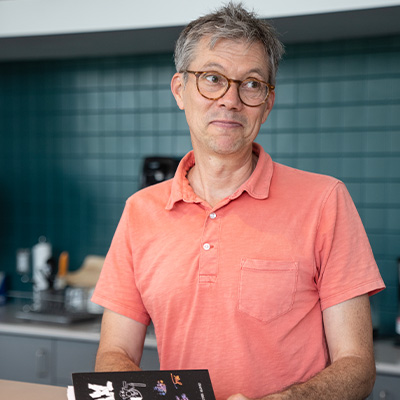Poetry Daily has two homes. Online, it lives at the url poems.com, where it provides a diverse range of poetry to 570,000 readers across the globe. But its physical home, where it is staffed by many Mason students, is the Watershed Lit: Center for Literacy Engagement and Publishing Practice at George Mason University.

Within Poetry Daily lives Poetry Alive!, a project initiated by Mason alumna Nicole Tong, MFA ’07, in her position as Fairfax’s first poet laureate.
“I always wanted to use George Mason as a central part of this project. The first iteration of the program had two components: to amplify the message that poets and poetry are alive and thriving, and to use Mason students as mentors for young poets just starting to develop an interest in writing,” said Tong.
Now in its second year, Poetry Alive! is conducting a workshop with the Fairfax Juvenile Detention Center (JDC) under the center’s BETA program, a year-long therapeutic program for male residents aged 14-17.

“This new program brings young poet-teachers directly into the lives of young people who want to find language for their own stories and who may want to see those stories and their connections with others in a new light as they move forward,” said Peter Streckfus, a co-director of Poetry Daily, one of Tong’s original collaborators on the project, and an associate English professor with the College of Humanities and Social Sciences.
“The goal of the program is to give the students who live and reside in the JDC more confidence, security and an ability to express themselves in a way that they weren't exposed to before,” said Megan Brooks, a second-year MFA poetry student working with the teenage boys at the center.
For Nick Ritter, a first-year MFA poetry student also working in the program, it was the idea of Poetry Alive! that drew him to Mason.
“I really wanted to teach incarcerated folks if I got the opportunity to do so,” said Ritter. “Having the balance between the pedagogy and the poetry lessons allows me to find different ways to get at the heart of what we're trying to do, which is to give a space for the students to feel safe expressing themselves in different ways.

“We're working with young boys, and there are a lot of masculinity conventions that make it difficult to just express oneself. My role as a teacher is to give them tools [to do that], but also to demonstrate expressing myself,” said Ritter. “Sharing my own writing amongst them [helps] to make them more comfortable, and I've noticed the boys being excited to share their writing with each other.”
As poet laureate, Tong launched the program with initial support from ArtsFairfax, which gave Poetry Daily a new grant earlier this year to continue their efforts in the community.
“As we continue to learn new ways that Poetry Daily can sustain itself as an organization, we also want it to have an impact in the community,” said Sally Keith, a co-director of Poetry Daily and professor of poetry at Mason. “It's been hard because it's a website, so how do you make a website do that work? For that reason, the Poetry Alive! JDC project has been a really rewarding application. It’s a tangible example of how poetry can change a community.”
What's Happening at Mason
- November 10, 2025
- September 29, 2025
- September 18, 2025
- August 6, 2025
- July 15, 2025
